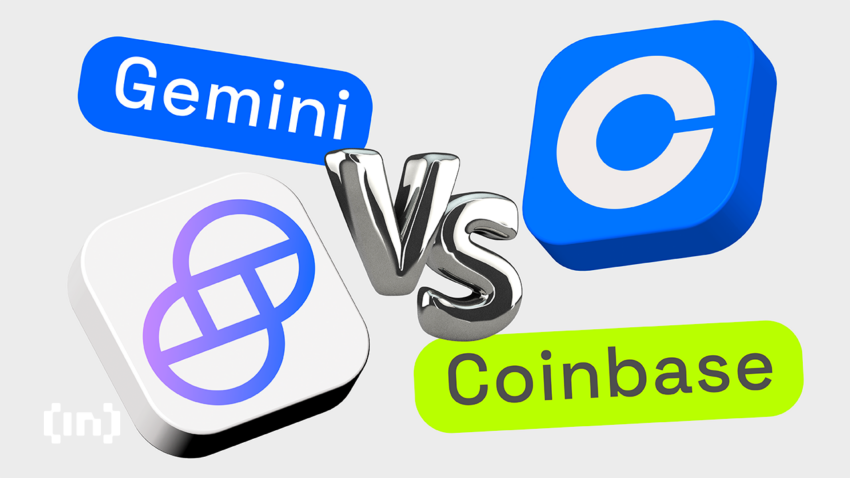Gemini and Coinbase are two of the most well-known exchanges for buying and selling cryptocurrencies. This comparative guide looks at Gemini vs. Coinbase and examines the key differences between the two platforms, including their features, fees, coins listed, security, mobile apps, and more.
KEY TAKEAWAYS
• Coinbase has a more user-friendly experience with a wider selection of cryptocurrencies, which is ideal for beginners.
• Gemini has advanced trading tools and data visualizations, making it more appealing to pro traders.
• Coinbase provides more staking options and educational resources to educate new crypto users.
• Gemini has a simpler and more transparent fee structure, while Coinbase Pro offers lower fees with more trading features.
Gemini vs. Coinbase: Ultimate comparison

Both Gemini and Coinbase have very competitive offerings and features. However, there are some areas where Coinbase excels over Gemini and vice versa. Here is a quick comparison, followed by a more detailed breakdown.
| Features | Gemini | Coinbase |
|---|---|---|
| Cryptocurrencies | 60+ | 150+ |
| Fiat currencies | 7 | 60 |
| Trading fees | 0.35% to 0.1% | 0.15% to 0.1% |
| Mobile | Android and iOS | Android and iOS |
| Learn-to-earn | No | Yes |
| Insurance | Up to $200 million | Up to $255 million |
Gemini vs. Coinbase: User interface
Coinbase provides a simple, intuitive trading user interface ideal for beginners. Customizable dashboards permit simple order entry across markets, and the Coinbase mobile app almost identically mirrors the desktop experience.
By comparison, Gemini’s desktop interface shows some dated elements next to Coinbase’s more modern styling. But Gemini also unveiled a redesigned mobile app with modern aesthetics and smooth performance.
For usability, Coinbase rates higher thanks to its responsive web design and seamless mobile syncing. Gemini comes in second on the desktop but redeems itself through its revamped mobile platform.
Both cryptocurrency exchanges support iOS and Android applications. This way, you can use your mobile app to quickly check balances, execute trades on the go, deposit/withdraw, and more.
Gemini vs. Coinbase: Supported currencies
Another point of departure is in their supported cryptocurrencies. Gemini supports over 60 coins, including popular choices like Bitcoin, Ether, and Litecoin. The platform also supports smaller cap coins, including Filecoin, Livepeer, and Skale, and has recently added DeFi tokens.
In comparison, Coinbase supports over 150 crypto assets by aggregating assets listed on Coinbase Pro, Prime, and Custody. The crypto exchange lists top coins like BTC, ETH, and BNB alongside emerging metaverse and altcoin picks. However, many smaller market cap assets don’t make the cut.
Coinbase is preferable for a variety of low and high-cap coins, from crypto mainstays to cutting-edge DeFi picks, while Gemini limits selection to popular coins focused on decentralization.
Gemini vs. Coinbase: Security and hacks
Both crypto exchanges emphasize regulatory compliance, implementing security features to safeguard client assets. These include cold storage mechanisms along with standard measures like two-factor authentication.
Additionally, both platforms carry private insurance policies covering a portion of holdings. The Gemini exchange insures up to $200 million, while Coinbase covers $255 million. Gemini also completed a System and Organization Controls (SOC) 2 Type 2 audit affirming security protocols.
Ultimately, the companies exhibit similar security features. Neither exchange has ever suffered a successful breach, resulting in client fund losses.
Gemini vs. Coinbase: Trading fees

The two exchanges have different approaches to their day trading fee schedules. Gemini fees employ a maker-taker model based on 30-day trading volume. The platform’s spot trading fees range from 0.35% to 0.1%. It also doesn’t charge deposit or withdrawal fees and allows users ten free crypto withdrawals per month.
Makers earn rebates between 0.1% and 0.35% for providing liquidity on Gemini by adding volume to order books. Conversely, takers pay fees up to 0.35% when taking liquidity from the order book via market orders. Active traders see decreasing fees to 0.1% based on 30-day volume thresholds surpassing $50 million.
On its part, Coinbase defaults to wider spreads of ~0.50% per trade. The exchange offers a scaled maker-taker model similar to Gemini through its Pro platform. Here, Coinbase fees start at 0.15%, reducing to 0.1% under volume tiers. Additionally, the exchange lets users convert crypto for free between supported wallets.
To get lower fees, Coinbase customers can use Coinbase Pro, which has a maker/taker model similar to Gemini’s, with rates capped at 0.1%. However, Pro features more complex order types and interfaces that are less friendly toward casual traders.
In summary, Gemini baseline rates are lower than on Coinbase without requiring platform upgrades. But Coinbase does allow potentially lower charges under Pro, albeit with added conditions. Considering overall ease and transparency, Gemini wins for a simpler and easy-to-understand fee structure.
Gemini vs. Coinbase: Educational rewards
One aspect that sets Coinbase apart is its educational content and incentives rewarding learning. Users can browse beginner-friendly guides explaining crypto concepts and watch videos to earn crypto.
Gemini lacks such intuitive, engaging educational tools to guide newcomers. Instead, it provides research reports like the State of U.S. Crypto report. However, no incentives encourage customers to increase their crypto comprehension on the platform. Coinbase has the edge here.
Gemini vs. Coinbase: Ease of use
Gemini has a lengthy sign-up process, a more advanced user interface, and a focus on active trading options. It mostly appeals to advanced cryptocurrency users. They also have less educational content to help their traders.
If you want an intuitive on-ramp to crypto, Coinbase wins for usability.
Gemini vs. Coinbase: Fiat currency support
Gemini allows funding accounts using seven fiat currencies. These include the U.S. dollar, the Canadian dollar, the British pound, and the Australian dollar. Others are the euro, the Singaporean dollar, and the Hong Kong dollar. This limits customers’ diversity in managing balances.
Meanwhile, Coinbase’s fiat currency support covers over 60 distinct fiat currencies, including the seven that Gemini does.
So, for non-U.S.-based cryptocurrency investors, Coinbase caters to more localized funding options, making it a more inclusive platform.
Gemini vs. Coinbase: Access
Signing up for either exchange is reasonably quick, following basic identity verification steps. This grants access to essential trading and account management functionality using the website or mobile applications.
Both also impose trading limits that progressively lift through submitting additional documentation. A fully verified status removes barriers to more active traders needing elevated permission. The user journey is almost identical across different access levels.
In contrast, Coinbase offers immediate account setup. Users can instantly trade up to $25,000 daily after providing basic personal information. Full KYC kicks in for higher volumes but is still faster than Gemini.
What is Coinbase?

Since 2012, Coinbase has established itself as an ideal entry point for first-time cryptocurrency traders. Now operating exchanges across 100+ countries, Coinbase makes crypto purchases easy using local payment methods. It supports 100+ coins, rivaling top global exchanges.
Features
Here, we explore the key features that define the Coinbase platform, along with its pros and cons.
- Lists over 100 cryptocurrencies
- Accessible in 100+ countries
- User-friendly design for crypto newbies
- Extensive trading options on Coinbase Pro
- Supports staking
Pros and cons
| Pros | Cons |
|---|---|
| Beginner-friendly web and app onboarding into crypto | High fees from conversion spreads and wire transfers |
| Regulatory compliance brings institutional trust | Hidden costs easily inflate pricing |
| Demonstrated security record protects against breaches | Occasional customer support delays |
| Wide assortment of educational content resources | The number of features can overwhelm newcomers |
| High liquidity makes filling large buys/sells easy | Unclear pricing structure |
What is Gemini?

Gemini is a leading regulated US cryptocurrency exchange launched in 2014 by Tyler and Cameron Winklevoss. It offers an intuitive platform for buying, selling, and storing digital assets. Moreover, Gemini supports more than 60 coins.
Let’s explore the key capabilities of the Gemini cryptocurrency exchange, along with its advantages and disadvantages. The exchange:
- List over 60 cryptocurrencies
- Available in 49 U.S. states and 59+ countries
- Beginner and advanced trading interfaces
- Has institutional-grade security
- Insured custody wallets
- Charges low trading fees
- Supports staking
Pros and cons
| Pros | Cons |
|---|---|
| Uses top-tier exchange security protocols | Limited payment methods |
| Has smooth web and mobile interfaces | ewer supported cryptocurrencies than competitors |
| Has direct oversight as a licensed New York trust company | Limited educational resources |
| Deep liquidity ensures the best price execution | Lengthy account approval process delays trading |
| A low-priced and transparent transaction fee structure | Geo-restricted from Hawaii and select countries |
Coinbase vs Gemini features compared
Both exchanges offer accessible on-ramps for new crypto investors, including low account minimums and funding options.
Coinbase currently supports over 100 cryptocurrencies compared to Gemini’s 60. For altcoin traders, Coinbase has a broader range of supported coins and tokens. The company also offers Coinbase Pro, which is a subscription with deeper liquidity tailored to active investors. Meanwhile, Gemini offers richer yield opportunities.
Ultimately, the platforms overlap strongly on core features but diverge based on niche specialties. Coinbase offers a user-friendly experience for beginners, providing access to a wide range of cryptocurrencies and high liquidity. On the other hand, Gemini stands out for its comprehensive selection of advanced trading tools and features tailored to meet the needs of more experienced traders.
Gemini vs. Coinbase: Other features
Beyond core buying/selling functionality, the platforms offer extra features to suit broader investing demands.
Buying and selling cryptocurrencies
“We’re starting to see more and more institutions that are establishing the ability to buy or sell cryptocurrencies on their platform.”
Matthew Schwartz, advisor at Great Waters Financial: MarketWatchPicks
Users first deposit fiat currency like USD to buy and sell crypto on Gemini. They then input transaction details specifying order type, volume, and price, enabling trading options like stop limits. Trades are executed quickly through Gemini’s order book, which links buyers and sellers.
Coinbase, on its part, streamlines buying crypto into three easy steps: Choose the asset and amount, link the payment method, and execute the order. Selling follows the same order. Users can configure additional order types like limits and stop losses as they like. Out of both exchanges, Coinbase offers a more straightforward user experience for newbies and advanced users alike.
Geographic availability
Both companies are headquartered in the United States, serving customers nationwide. However, their international access differs. Gemini conducts business in over 60 countries globally. Meanwhile, Coinbase has managed full or partial launches in over 100 countries worldwide.
Staking and rewards
Gemini offers staking rewards on three coins, including Ethereum (ETH), Matic (MATIC), and Solana (SOL). Crypto investors can earn APYs of 2.54%, 1.79%, and 3.66%, respectively, for these coins.
Similarly, Coinbase supports 15 coins for staking, like ETH, Tezos (XTZ), and Cosmos (ATOM). Investors can use Coinbase Earn for yields of 3.85% for their staked ETH and up to 10% on other crypto assets.
Gemini vs. Coinbase: Customer support
Both exchanges provide customer assistance through email ticketing. That’s besides detailed site FAQs and resource-rich support centers. Average response times run 24-72 hours, barring critical issues. Additionally, they have active social media profiles for fielding inquiries.
Between the two, Gemini historically faced greater criticism regarding support backlogs. But bolstered staffing cut resolution times to under an hour for many requests. Ultimately, effective customer support comes down to inquiry type more than the exchange itself. For support inquiries, Coinbase rates better on speed.
Gemini vs. Coinbase: Cryptocurrency storage
Alongside exchange services, Gemini provides the Gemini wallet app for personal cryptocurrency storage. Users fully control assets on the non-custodial wallet, which carries some inherent risks. Coinbase similarly lets users self-manage crypto holdings directly on mobile. Moreover, one can link to a Coinbase Exchange account.
NFT support
Both exchanges support NFT marketplaces that facilitate discovering and showcasing digital collectibles and NFT peer-to-peer (P2P) trading. Gemini does so through its Nifty Gateway, while Coinbase uses its in-house NFT marketplace.
Hardware wallet integration
For ultra-secure offline asset storage, Gemini supports hardware wallet integration through WebAuthn. Coinbase also supports the integration of Ledger wallets. These tools give users freedom over their funds and provide an extra layer of protection compared to hot wallets.
Token swaps
A built-in swap feature on Coinbase allows the convenient exchanging of one crypto asset for another without converting it into fiat currency. Gemini lacks native token swap capabilities.
Exploring the similarities between Coinbase vs. Gemini
Despite the differences highlighted in this guide, Gemini and Coinbase retain fundamental similarities that underpin leading centralized cryptocurrency exchanges:
| Feature | Gemini | Coinbase |
| Regulatory compliance | Yes | Yes |
| Web + mobile trading interfaces | Yes | Yes |
| Custodial + private wallets | Yes | Yes |
| New account sign-up bonus | Yes | Yes |
| Robust platform security | Yes | Yes |
| Insurance of funds | Yes | Yes |
The digital duel: Which exchange is better?
In the Gemini vs. Coinbase battle, the choice ultimately depends on individual preferences and priorities. Gemini excels in security and compliance, making it an ideal choice for users prioritizing these aspects. On the other hand, Coinbase’s user-friendly design, extensive coin offerings, and global accessibility make it a favorite for a broader audience.
When choosing between the two, consider your trading goals, geographic location, and specific feature requirements when deciding between these two prominent cryptocurrency exchanges. While the two platforms are similar in many ways, we found nuances that differentiate them.
Overall, this comparison found Coinbase to be the most beginner-friendly, thanks to its simple interface and exhaustive educational materials. Conversely, Gemini provides advanced charting and data visualizations, features that appeal to pro traders.
Frequently asked questions
Is Gemini in trouble?
Is my money safe in Gemini?
Is Gemini a safe place to buy Bitcoin?
Is Gemini worth investing in?
Are there mobile apps for Gemini and Coinbase?
Which one is better: Gemini or Coinbase?
Is Gemini safer than Binance?
Is Gemini a trusted platform?
Who owns the Gemini platform?
Is Gemini a U.S.-based company?
Disclaimer
In line with the Trust Project guidelines, the educational content on this website is offered in good faith and for general information purposes only. BeInCrypto prioritizes providing high-quality information, taking the time to research and create informative content for readers. While partners may reward the company with commissions for placements in articles, these commissions do not influence the unbiased, honest, and helpful content creation process. Any action taken by the reader based on this information is strictly at their own risk. Please note that our Terms and Conditions, Privacy Policy, and Disclaimers have been updated.




